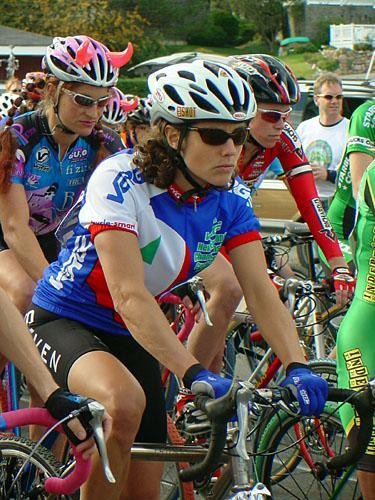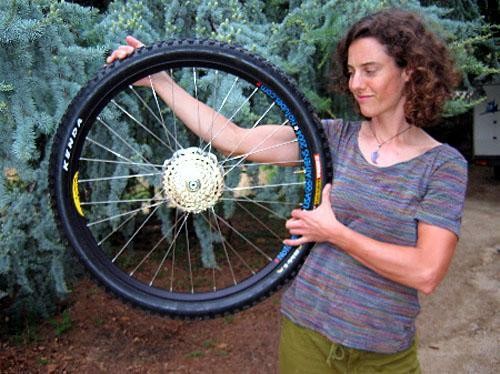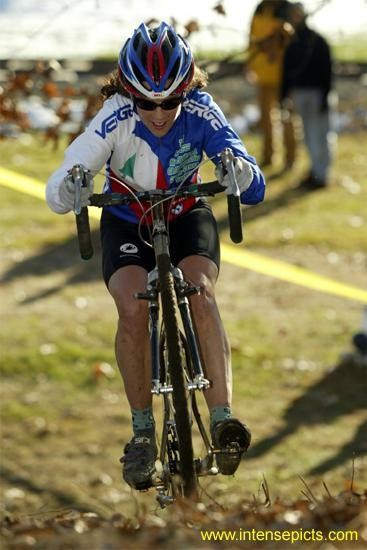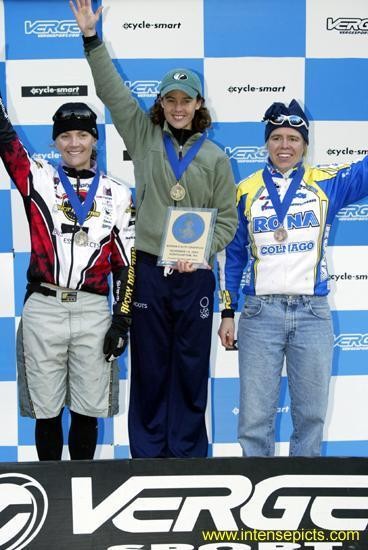A vocal nomad living her dream
When USA Cycling and the U.S. Olympic Committee announced its selection to fill the single allocated...




An interview with Mary McConneloug, November 20, 2004
When USA Cycling and the U.S. Olympic Committee announced its selection to fill the single allocated slot in the 2004 Athens women's mountain bike race, Mary McConneloug (Seven Cycles) came in second - by one point. After a scan of the criteria and the calculations used to come up with the selection, McConneloug knew she had to stand up and dispute the results. She could have been quiet. She could have accepted the mistake, faded into the off-season and wait her next chance to race in the world's greatest venue. But she didn't.
Instead, she summoned the courage to ask for a review by an independent arbitrator. For her trouble, she suffered the indignity of being branded a sore loser, of media scrutiny that sensationalized the dispute as a personal battle between her and Sue Haywood, the originally selected racer and a woman McConneloug considers a good friend to this day. The Fairfax, California native says she stood firm "not just for me, but for the integrity of the sport" and she was rewarded with one of the sweetest days of racing in her six-year career.
Cyclingnews' Steve Medcroft caught up with U.S. Olympian, U.S. National Mountain Bike Cross Country Champion and cyclocross racer Mary McConneloug at her off-season hunting grounds on Martha's Vineyard, Massachusetts - to learn more about her nomadic lifestyle, her reflection on racing and about that hot Wednesday afternoon in Athens.
A vocal mountain biker
Cyclingnews: You've said before that you started riding bicycles to and from school when you were six years old and have always ridden for transportation, but riding professionally wasn't your first aspiration. You went to school for something else entirely, right?
Mary McConneloug: I went to Santa Clara University and studied voice. I sang classical and opera, giving recitals and singing in different languages. I played piano also.
Get The Leadout Newsletter
The latest race content, interviews, features, reviews and expert buying guides, direct to your inbox!
CN: Are you still involved with music?
MM: I am, but in a transformed way. I always will have my love for singing and for making music but what I did before was more performance. I didn't write anything; I just performed and sang songs written by other people. These days, I prefer to do improvisation. Michael (Broderick, McConneloug's long time partner and teammate) plays guitar and just last night for the first time this year we got together with his brother and a friend and play music. This isn't the harpsichord-accompanied classical music I used to perform, this was electric guitar, electric bass, and drums. I got on vocals and had fun, making up words and falling into a funk/blues/jazz vibe. So yes, I am still involved with music but it has evolved into something different. I don't have a lot of time for it, which is what it takes to be one of the top musicians, but I love it anyway.
CN: Were you on a music career-path before cycling?
MM: I had goals but now that I look back I know I wasn't as serious as I am about mountain biking. I was offered a scholarship and I didn't know what else I wanted to major in so I majored in music. The career options with that major are to teach or perform. I knew I wanted to perform but again, I didn't approach it as serious as I approach what I do now.
CN: Are there elements of your vocal training or philosophy that translate into your cycling career?
MM: I think I've taken a lot of what I've learned from my music to my mountain biking. Physically, learning how to breathe deep and using that breath in an efficient way has helped me. Learning how to perform on the spot has helped too - in recitals, for example, if you forget words or make mistakes, you just have to carry on. And never let the audience know that things were messed up. I took that sense of improv under pressure with me into mountain biking. If I get a flat tire, break a chain, I feel like I'm able to just fix it and go on. With a smile on my face. I also learned to be disciplined - in music that mean to train my voice and learn the materials I was performing. In mountain biking, it means the discipline to be able to focus, see where my weaknesses are and work at them.
From Sport to Pro in one year
CN: What took you to your first mountain bike race?
MM: Someone mentioned it to me about four years before I actually did it. I used to ride a mountain bike all the time. I had always been an athletic kid. I just loved sports: I loved P.E., kickball, dodge ball, jump rope, anything. I was always climbing trees, always playing outside. I loved nature and being outside. My family, for fun and for vacations, would go camping. Every Sunday we'd hike after church. I spent a lot of time outdoors in Marin County and that's a huge reason why I love mountain biking so much. All I wanted to do was be outside, play outside and ride my bike. As I grew up, I rode my mountain bike all the time. No Lycra or anything like that, just high top tennis shoes. I guess I did carry a few tools but no helmet, no special clothes. I'd ride for fun, for hours at a time.
So this person said something like, "You're speedy, you should try mountain bike racing" and I never did it. Three years later, I was living in Seattle. On my days off I'd mountain bike and my boyfriend at the time said, "Mary, you should try mountain bike racing, you'd love it." It sounded fun so I gave it a shot.
CN: You turned pro very quickly?
MM: My first year, I did two races as a Sport class rider then moved up to Expert. I decided to upgrade to pro because one day I beat the pro rider and got a tee shirt instead of the money. I also met Mike that first year. Then we started traveling and since then we've split time between Mike's family's home on Martha's Vineyard and my family's home in Marin, with all the time in between traveling and racing.
CN: You lead something of a nomadic lifestyle then?
MM: Yeah. If you're on a tight budget, if you don't have a home, being a nomad works. In my case it has been necessary because at times literally all I've had are my bikes, my passion for cycling and some really great friends and family. The fact that Mike is also a professional mountain bike racer and he has so much passion for the sport as well makes it easy. We take our home with us where we go.
CN: Were you a nomad or a mountain biker first?
MM: I think I evolved into being a nomad. I've always loved to travel. I did Europe with a backpack right out of college. I traveled across Canada with my sister; our mountain bikes in the back of a Volkswagen van. But mountain biking really lends itself to being a nomad. The races are scattered all over the United States and I've always been tight with the budget. We drive, camp, cook and race. It's just how we live.
CN: How did you get by early in your career? Were you sponsored?
MM: Mrazek (a Czech manufacturer) was my first sponsor - they gave me a frame. Then I raced for Team Micro Supreme on a Gunnar from Richard Schwinn's [grandson of the Schwinn] Waterford factory in Wisconsin [the original Schwinn manufacturing facility]. I was getting by with bike frames for a while then Jamba Juice picked me up in 2000. It was a great team, my first where everyone had matching jerseys and some expenses covered. We actually got to stay in condos at the NORBA nationals instead of sleeping in a tent.
The next year, the Jamba Juice sponsorship ended and we didn't know what we were going to do. I started out the year finishing third in short track at the NORBA national in Big Bear. We had just sent our resume out to Seven Cycles and after that race they told us to come by. We drove all the way to the East coast, where they measured us. A week later they had our frames ready. We did the nationals at Red Wing right after and I remember that race vividly. I made it to the podium in cross country for the first time. It was exciting to have the support of our new sponsors. The fact that they accepted Mike and I as a couple was just the coolest thing. That was the beginning of my true career in the sport.
CN: Has life gotten any easier now that you're a seasoned pro? Couldn't you now sign on with a full factory team and have all your needs met?
MM: I think we're going to continue with our simple approach. Both Mike and I like to have the freedom to choose when and where we're going to race. One of the things about the big factory teams is that when they decide that you're done, you're done. I don't like anyone to have control of me like that.
I feel like we have also invested a lot of time and effort in building the relationship with these companies. We've hand selected who we work with because we really believe they're the best products out there. We run them for reasons of superior quality and performance. Stan at NoTubes.com is a great example of this. The guy is incredible. We were racing for Jamba Juice in 2000 and Stan's wife Cindy approached us. The product is cutting edge technology and has absolutely helped us rise to the top. I feel like that it's the companies like this - that took the time to care about us when we were peons - that deserve our loyalty now I'm an Olympian.
CN: Let's shift to racing. I see a national championship, silver medal in a Pan-Am Games. How did your career progress?
MM: The national championship year was great. Mike and I were traveling around in our inherited Seven Cycles van with a trailer, which was our makeshift shop. We camped all over the United Stated. We drove up, down, zigzagged all over the place to make it to every single NORBA national even though there was no prize money and no UCI points - just for the sheer love of racing our mountain bikes. I raced consistently all year long and then in Mount Snow, Vermont, I just took it. It was the first NORBA race I ever won and I just took it. That race showed me that I could win, that I could beat Alison Sydor and Jimena Florit. Just to have a glimpse of that was huge. From there, the next biggest highlight in has to be the world cup race in Calgary where I finished second behind Gunn-Rita Dahle.
CN: You got the hole shot and held onto it?
MM: Oh no. I was riding back in tenth through the single track but I knew that there were climbs coming up within the single track where I'd be able to pass if I didn't blow it all in the start loop. Sure enough, riders were just blown by the time they got to the single track and I was able to just squeak by people right and left, up and down. Next thing I know I riding right behind Anabella Stropparo. I could see Gunn-Rita Dahle ahead of us. Annabella was sort of holding me up in the single track and I knew that I could get around her so pedal stroke by pedal stroke I worked and ended up riding away from her. I closed in on Gunn-Rita and ended up only 45 seconds back at the finish, which was as close as anyone was getting all year round. This was right before the Olympic selection. I felt that I proved I was worthy.
An Olympic controversy
CN: Okay, about the Olympics. It must have taken a lot of courage to stand up and contest a decision that put Sue Haywood into the single U.S. Olympic slot. What was going through your mind when you decided something wasn't right with the selection points?
MM: It was a huge lesson for me. In the weeks leading up to the selection I was being told, "Whatever the choice is, you have the right to an arbitration." It was as if USA Cycling and the USOC was expecting arbitration no matter who was chosen. The fact that it came down to one point according to them meant that I just couldn't sit there and take it. All year I had felt like getting to the Olympics would have only been a bonus on an already incredible season for me and we weren't expecting to go but when it came down to one point I was like, "Wait a minute here." I just wanted a third-party neutral decision on this because the criteria they used to justify the selection seemed to be full of discrepancies compared to the stated criteria. I needed to speak up. Not just for me but for the integrity of the sport.
CN: You prevailed thorough the process and got to represent the U.S. in Athens. How was the race, the experience altogether?
MM: It was incredible to be in Athens. To actually get there - to show up in the hot, dry air with the wind was blowing and realize, "I'm in this totally foreign land for the race of my life." I stayed in the athlete's village for five days and just to be there was pretty spiritual, an incredible journey. Although the other people in the village had no idea what I had to do to get there, I knew. And was going to everything in my power to be as ready to race as I could be. I stayed in my room, did my yoga, chilled out, focused on the course and training. The course was beautiful.
I was so ready to race when it finally came. I remember getting my call-up, second to the line because of my ranking. My family had come all the way from California. My sponsors came from Boston. Mike took the RV down on a Saturday and met me there. It was incredible. Then the gun went off and I bogged. I shouldn't have started in my big ring. Even thought the start was flat and on kind of a slight incline, I should have been in my middle ring so I could get out front. So I bogged a little bit and as soon as I knew it, I was in the tenth spot. I charged up this hill, messed up a little corner up and ended up fifteen back and all in the first three minutes, there went my chance of being in the front. But that's how racing is, you know. Things happen and you just need to adjust and deal.
It was so hot that day, probably 90 degrees in the shade at 11 when we started and hotter still over the two hours of the race. In each lap, I moved forward a couple of spots and on the last lap I made it back to ninth. It was victory for me. I had come back from so far. It was incredible to be there, to finish in the top ten.
CN: Cyclocross season is in full swing. You're a crosser as well?
MM: I am a cyclocross racer. I love cyclocross. When I came back, I thought that I would just do some racing for fun, take time off and train lightly. I still had a little bit of fitness from the year though and last weekend (Gloucester US Gran Prix of Cyclocross events), I realized I can't just race for fun because when I get out there I want to win. And if I want to win, I have to train hard. So then, despite wanting a break, I still have real ambitions for the 'cross season, times when I feel like, "Yes, I want to do this, I want to go to nationals, maybe have a shot at being national champ." Then I have other moments when I just want to pick cranberries, bake bread and hang out.
So for now, I'm just going to take it day by day and we'll decide in the next few weeks whether we should go out to nationals (December 10 through 12th, 2004 in Portland, Oregon).
CN: Your career has grown organically over the years. Are here some specific goals that keep you moving forward?
MM: I have a long-term goal right now that I will be hard and firm on for the next four years: I want to race in Beijing, have another shot at the Olympics. As for 2005, I want to keep seeing my fitness rise to that next level. I'm just seeing clearly now that success in racing is really about commitment and dedication and over the years you become able to commit more and dedicate more. I'm at that point where this is all I want to do. So yes, I want to be national champion next year and yes I'd love to win NORBA's and get up on that podium for the world cups. I definitely have goals but I think you get there by keeping the flow and the balance and having fun at it too. Do that and life is sweet.
Related stories
July 17, 2004: Haywood completes US Olympic MTB team
July 18, 2004: McConneloug appeals for spot on U.S. Olympic MTB Team
July 21, 2004: McConneloug wins appeal
August 9, 2004: Haywood loses appeal
Other Talking Cycling Interviews